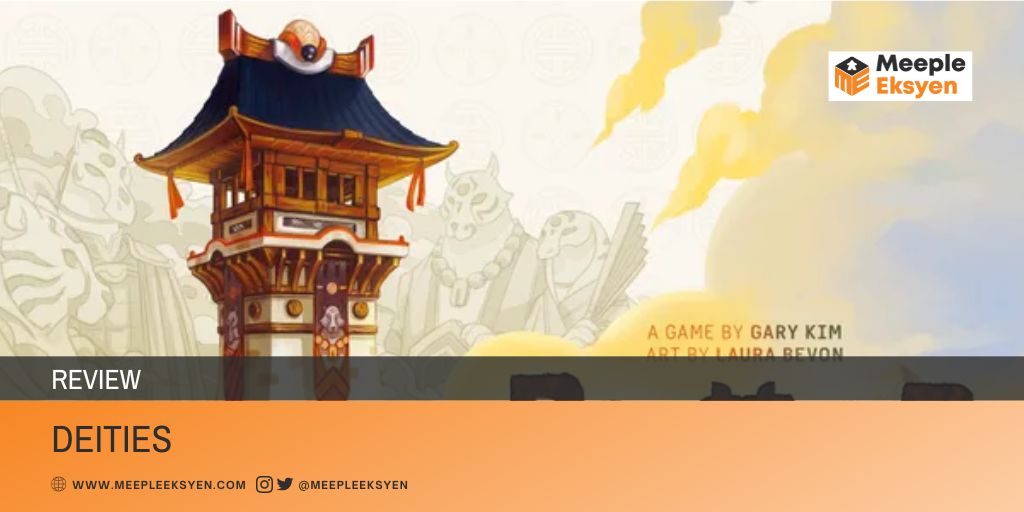Most longing for it, but straddling the line between human and ancient Deities is tiring, if not daunting. Surely, these celestial beings wield immense and magical powers. Yet don’t go thinking it’s always as fun and majestic as rainbows and unicorns. Spider-Man has learnt it the hard way.
With great power comes great responsibility
Uncle Ben
Navigating existence isn’t a cakewalk. Especially when they’re hand in hand with humanity. A combination of free will and still figuring out the ABCs of development. It’s like babysitting the universe’s toddler while juggling supernovas. Thus, hold on to the thoughts to seize your cosmic crowns.
A short disclaimer before you read my board game analysis
As an avid euro gamer and hardcore Legend of the Five Rings (L5R) LCG player, my reviews may reflect a preference for these styles, and I may not cover solo games/variants extensively. Please note that my personal remarks are based on my gaming experiences, and I aim to provide honest insights within the scope of my preferences.
Alas, Mandoo Games. It’s a name that rings our gaming bells! Hailing from South Korea, these folks have been on our radar ever since we crossed paths at our very first SPIEL Messe. Their knack for baking light to medium-weight euro games has piqued our interest, and Deities is like the icing on the board game cake they have in their menu. I’m willing to bet it dishes out a hearty helping of satisfaction, and who knows, it might just throw in some extra sprinkles of delight too.
A GENERAL BOARD GAME ANALYSIS ON DEITIES
Gary Kim’s approach on Deities could evoke a nostalgic reverie over the classic Othello. Or well-known more as Reversi, for those who’ve been longer around the block. Again, there’s always a fresh twist.
The familiar concept of aligning then-three discs is crafted into a rather new way of playing that promise more than just a simple flip to assert territorial dominance. They reward you with the corresponding resources on the now-Resource tokens. This fusion of the classic and timeless mechanic with a novel approach injects an interactive flair, letting players strategize and construct upon their gained resources.
As previously stated, players attain resources once Resource tokens are flipped in Deities. Unlike Reversi and Othello, this one shifts the spotlight from ’tile placement as the key to area majority’ to a mere vehicle for resource provision. These resources stand as the currency. The ducats we pay to achieve our objectives. This tweak adds a layer of decision-making. Its implications are more far-reaching. Beyond the immediate resource gain, shortly speaking. In addition, as the board’s constellation shifts, we feel the impact to future tile placement possibilities in subsequent rounds.
The ever-shifting Resource tokens disrupt the feasibility of premeditated strategic moves, adding a challenging and tactical dimension to Deities. While primarily tactical, the game maintains a strategic element through resource management.
With a maximum storage of six resources, the game is prompting the need to efficiently gather resources from the board before contemplating the building of one of the three available constructions: temples, towers, or walls. This construction aspect notably hinges on timing, introducing that needed strategic layer, into some extent, to the gameplay.
Building the constructions & Area majority
The strategic aspect of Deities truly sparkles through its diverse construction options. The building models in the box transcend mere aesthetics when standing on the board. They are pretty unassuming. One may innocently think they are merely indicators of the area majority. Yet, these building mock-ups remind you of different advantages brought by each type. But don’t rush in like a bull in a china shop – timing is pivotal in this construction business. Haphazardly building your structures is a recipe for disaster. It can lead to costly setbacks. And we definitely are not serving it soon.
As securing dominance across squadrons becomes imperative, acquiring area majority by building over the opponents’ ones sounds like a tantalizing prospect. It does not only add more presence of your houses. This move also denies your adversaries’ influences. Two benefits in a manoeuvre. However, forging new constructions presents another avenue for strategic consideration. It promises additional nett points, especially when aiming for the coveted corners of squadrons to activate Sanctum scoring.
It’s intriguing to see the interplay of constructing over opponents’ buildings. This move introduces another captivating layer of grand planning. While this cheeky move asserts ownership upon completion, we also bestow advantages to the previous owner, if, as mentioned, it’s not ours earlier on.
Two points for the other house, to be precise. A fascinating trade-off. This inevitable dynamic adds depth and more interaction. Building over own buildings is not a solution either. That would tax heftily over our resources.
Distinct construction types offer varying advantages. People could jump into the conclusion that erecting the second and third levels (temple and tower) is more essential. An understandable logic, though. With constructing on the higher plane, we can secure the majority without worrying to get built over. Nevertheless, for me, the often overlooked low-tier walls, for instance, hold a hidden potential. To begin with, they are affordable. And the immediate acquisition of Disciple display afterwards creates a compelling engine-building facet. The advantage brought by this action could deter opponents to thwarts our momentum.
Another board game analysis: experience with two-player mode
At Meeple Eksyen, our constant endeavour is to deliver superior and specialized content. We understand that certain games achieve their optimal experience with the sweet spot of a minimum of three players. However, many publishers provide a duelling option to accommodate two players as well. In our pursuit of innovation, we are excited to introduce a fresh approach: dedicated reviews and remarks for the two-player variant of each board game we play. We hope you enjoy this.
A subtle tweak in the setup, and voilà, the two-player version of Deities emerges, ready-to-play. Unlike other variants laden with a barrage of extra rules and components, Gary rather keeps his game elegantly streamlined.
Deities gets creative with its two-player mode by introducing Ruin tokens. They are unassuming, yet impactful elements, that strategically block some tiles within each squadron. This ingenious addition technically shrinks the board. Well, it actually helps both players make a beeline for those coveted corners. With ruins in play, the road to Sanctum scoring becomes a balanced challenge, preventing the board from feeling too vast to conquer. The trade-off, of course, is a slightly diminished space to build and to reap resources, but don’t worry – it’s only a minor speed bump.
Diving into the two-player realm flips the gaming meta. Unlike the frenzied dynamics of greater player counts that constantly reshape the board, the tango of Deities in this duel variant unveils a more calculated dance. Predictable shifts unveil themselves, but only if you observe the whole open information on the table. Deities for two heightens strategy aspects and meticulous tile placement. A reminiscence of its predecessor’s finesse.
FINAL REMARKS
As anticipated, Mandoo Games consistently delivers quality, and Deities is no exception. It stands as a decent addition to the realm of euro games, fitting more within the lighter spectrum. The seamless coupling of area majority, engine building, and resource management forms a cohesive and engaging gameplay experience. While Deities might not boast extensive replay value due to limited variations, it shines as a go-to option for quick and engaging sessions. Whether you’re seeking a swift gaming option or aiming to introduce the captivating world of euro games to newcomers hungry for a challenge, Deities certainly merits exploration.
Do you love board games as much as we do? Support us!
Thank you for reading our articles! If you enjoyed our work and want more captivating board game contents, make sure to:
👉 Follow us on our social media — you can find us on ![]()
![]()
![]() Click one of the icons to land on our social media, or find us @meepleeksyen there, it’s just a click away! Stay updated with our latest board game reviews and previews by following us on those platforms 📱👍
Click one of the icons to land on our social media, or find us @meepleeksyen there, it’s just a click away! Stay updated with our latest board game reviews and previews by following us on those platforms 📱👍
💬 Do you have contrasting opinions? Leave a comment — share your thoughts with us, we’d love to hear (or read) yours! Have you played this game before? Did you have something similar as well? Or perhaps, something more personal, like what are your favourite board games? Let’s discuss in the comments below!
🙏 Support Us! Your generous support can help us produce even better content in the future. If you love what we do, consider making a donation to our blog. Every contribution counts and means a lot to us! You can either donate locally with Indonesian Rupiah (IDR) via Trakteer ![]() or for international readers with another currency through Buy Me a Coffee
or for international readers with another currency through Buy Me a Coffee ![]() It helps us to survive, too! 💰 Click one of the button below 👇
It helps us to survive, too! 💰 Click one of the button below 👇
I am a full-time food technologist during weekdays. However, when the calendar hits weekends, I transform into an avid board gamer. I am a hardcore Legend of the Five Rings (L5R) LCG player from Fantasy Flight Games (FFG). Current hobby: buying board games. My shelf of shame’s list is getting longer, thanks to you, Kickstarter.




